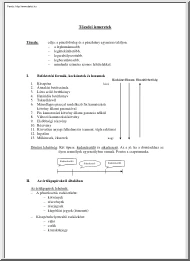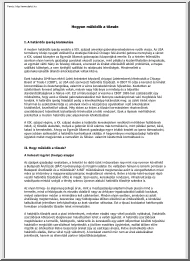Datasheet
Year, pagecount:2020, 3 page(s)
Language:English
Downloads:2
Uploaded:December 10, 2020
Size:654 KB
Institution:
-
Comments:
Attachment:-
Download in PDF:Please log in!
No comments yet. You can be the first!
Most popular documents in this category
Content extract
Source: http://www.doksinet Negotiating Better Bank Loans A Buyer’s Market Today’s banking environment has changed. The Federal Reserve Bank recently lowered the Federal Funds rate to one percent, and interest rates are as low as they have been in 45 years. That was the Fed’s 13th rate cut since January, 2001, and many analysts predict interest rates will remain low for the foreseeable future. Banks have been consolidating and expanding at the same time, with new names showing up everywhere. They are sponsoring everything from sports arenas and events, to concerts and museum exhibits. Banks are competing aggressively for customers, so it is now a “buyer’s market” in the loan business. As a result, loans are being negotiated and closed with lower rates and better terms than ever before. The refinance market is booming, and you should be very aggressive when negotiating your new business loans. Here is our Top Ten List for getting the best deals from commercial lenders. 1.
Negotiate better interest rates Don’t just accept the rate offered! Ask for lower rates, longer periods of fixed rates, and better schedules for adjustable rates, so that you get the lowest possible rates for as long as possible. Also, try getting a LIBOR based rate (the London Inter-Bank Offered Rate, which is the floating rate some European banks charge each other for large loans or overnight funds), since it is generally a lower index for adjustable rate loans that is now offered by many US commercial banks. 2. Negotiate lower loan fees In today’s banking environment, there’s no need to stop your negotiating with just the interest rates. Negotiate for lower fees as well As banks compete for your business, to make your best deal, ask for lower application, appraisal, commitment and document preparation fees, as well as lower points, discounts fess and even legal fees. 3. Negotiate longer amortization periods and loan terms Amortization is the calculated method for how the
principal is paid back and the interest is charged for your loan over a fixed period of time, assuring that the principal is completely repaid at the end of the loan term. Each installment payment is a calculated combination of principal and interest. Your goal should be to analyze and obtain the right payment amount for you - the longer the amortization period, the lower the installment payment. If the loan term is shorter than the amortization period, a balloon principal payment will be due at the end of the loan term. You may want to take advantage of today’s low interest rates by getting a fixed rate loan for as long a term as possible, with the longest amortization period available. 4. Negotiate for no prepayment penalties Lenders often impose prepayment penalties to discourage loan payoffs and refinancings, and assure a favorable interest income flow. These penalties are fines imposed by a lender on a borrower who wants to pay-off all or a significant part of a loan earlier
than its due date. Such penalties are often significant in the early years of a loan, and then reduce gradually as the loan matures. Since today’s interest rates are so low, lenders will often waive any prepayment Source: http://www.doksinet penalties, if you ask, to encourage you to refinance at a later time when they anticipate the interest rates will be higher. This will allow you to keep your borrowing options flexible for the future. 5. Negotiate for no “confession of judgment” default remedy A confession of judgment is a powerful legal remedy for lenders to use against borrowers who are in default under a loan. It allows the entry of a judgment of record against a borrower without the formality or protection of a regular lawsuit and judicial proceeding. The borrower does not receive advance notice and does not have the opportunity for a trial or hearing before the judgment is granted. This procedure has been ruled unconstitutional (as a denial of the right to due
process) in most states, and severely limited in those states where it is still allowed, such as Pennsylvania. However, for a confession of judgment to be used by the lender, the borrower must grant this power in the loan document at the time the debt is incurred. With competition for your loan business as intense as it is, many PA borrowers have been able to negotiate the confession of judgment remedy out of their loan documents. If you can do this, your legal rights will be better protected in the event of a default. 6. Negotiate for no “unlimited guaranties” Banks try to get as much protection as possible for their loans. With commercial borrowers, lenders often demand unlimited guaranties by other affiliated business entities, by the individual principals of the business, and sometimes by the spouses of those principals. Lenders want these guaranties so that in the event of a default they have alternative sources of funds from which to recover payment of the debt. However, it
is possible today to negotiate the elimination, or at least limitation, of such guaranties. In order to protect and shield your personal assets and the assets of your other non-borrower companies in the event of the borrower’s default, do your best to avoid such unlimited guaranties. 7. Negotiate for “notice and right to cure” defaults In every commercial loan, the borrower has both monetary and non-monetary obligations. Monetary obligations require the payment of money, usually monthly installment payments. Non-monetary obligations require the borrower to either do certain things (affirmative obligations), or not do certain things (negative obligations), such as maintaining insurance, maintaining the collateral, providing financial statements and not creating more debt. In the event of a default by the borrower for failing to make required payments or for breaching an affirmative or negative obligation, the lender has the right to immediately exercise its legal remedies under
the loan documents. However, banks often agree to give the borrower advance written notice and the right to cure or fix (typically, 30 days) non-monetary defaults before seeking legal redress. They have generally refused to give such notice and the right to cure monetary defaults, arguing that the borrower should know when it has not made a payment on time. As we all know, that is not always true Payments can get lost or delayed in the mail, errors can occur in sending or posting payments, and devastating financial consequences can result if a loan is defaulted for an innocent and unknowing mistake. Therefore, it is very important for borrowers to negotiate for notice and the right to cure monetary defaults, even if only for a limited time period such as five days, or for a limited number of occurrences such as no more than two times in any twelve month period. With the competition for loans today, it is now possible to negotiate for the inclusion of such an important protective right.
Newsletter article - bank loans 7-21-031 (1).docxNewsletter article - bank loans 7-21-031 (1)docx Page 2 of 3 Source: http://www.doksinet 8. Negotiate limitations on collateral Lenders always want as much collateral as they can possibly get to protect their interests in a commercial loan. Collateral is the bank’s security for repayment, and provides alternate sources of repayment funds in the event of default by a borrower. The loan documents usually give the lender a lien against the identified and pledged collateral, whether it is real estate, inventory, accounts receivable, fixtures, equipment, stock or other types of assets. While it is generally not possible to avoid the pledge of collateral for a commercial loan, today a savvy and strong borrower can negotiate certain rights with respect to the collateral that limit the lender’s grip and offer flexibility to the borrower. For example, a borrower should try to limit the amount of the collateral, retain the right to
substitute collateral, and retain the right to exercise rights as the beneficial owner of the pledged collateral (i.e receive dividends, vote, sell in the ordinary course of business). 9. Negotiate for reduced loan covenants Commercial loan documents always contain financial and other covenants, both affirmative and negative, requiring the borrower to do, or not do, certain things that if violated can constitute a loan default. Such covenants often include compensating balance and depository requirements, maintenance of financial ratios, keeping collateral property insured and in good repair, providing periodic financial statements and tax returns, providing copies of leases, not creating additional debts or borrowings, not changing management or ownership, etc. Now, some of these and other loan covenants are negotiable. A borrower should attempt to delete or limit those obligations that are most difficult and undesirable for its business. 10. Negotiate all of your loans as a package
Finally, as in any business, volume matters. For the best loan provisions and rates in today’s banking environment, try negotiating a package deal with one lender for all of your loan requirements. With interest rates as low as they are, consider refinancing existing borrowings when applying for new loans. If you negotiate your lines of credit, commercial loans, mortgages and personal loans all at once with the same lender, you can often get the best terms. Everything is now on the table for negotiation. Shop around for the best terms, and tell your prospective lenders that you are comparing loan offers from competing banks. Take advantage of today’s banking environment, and you will get the best deal you have ever had. For further information, please contact Gary A. Krimstock at 215-893-8722 Newsletter article - bank loans 7-21-031 (1).docxNewsletter article - bank loans 7-21-031 (1)docx Page 3 of 3
Negotiate better interest rates Don’t just accept the rate offered! Ask for lower rates, longer periods of fixed rates, and better schedules for adjustable rates, so that you get the lowest possible rates for as long as possible. Also, try getting a LIBOR based rate (the London Inter-Bank Offered Rate, which is the floating rate some European banks charge each other for large loans or overnight funds), since it is generally a lower index for adjustable rate loans that is now offered by many US commercial banks. 2. Negotiate lower loan fees In today’s banking environment, there’s no need to stop your negotiating with just the interest rates. Negotiate for lower fees as well As banks compete for your business, to make your best deal, ask for lower application, appraisal, commitment and document preparation fees, as well as lower points, discounts fess and even legal fees. 3. Negotiate longer amortization periods and loan terms Amortization is the calculated method for how the
principal is paid back and the interest is charged for your loan over a fixed period of time, assuring that the principal is completely repaid at the end of the loan term. Each installment payment is a calculated combination of principal and interest. Your goal should be to analyze and obtain the right payment amount for you - the longer the amortization period, the lower the installment payment. If the loan term is shorter than the amortization period, a balloon principal payment will be due at the end of the loan term. You may want to take advantage of today’s low interest rates by getting a fixed rate loan for as long a term as possible, with the longest amortization period available. 4. Negotiate for no prepayment penalties Lenders often impose prepayment penalties to discourage loan payoffs and refinancings, and assure a favorable interest income flow. These penalties are fines imposed by a lender on a borrower who wants to pay-off all or a significant part of a loan earlier
than its due date. Such penalties are often significant in the early years of a loan, and then reduce gradually as the loan matures. Since today’s interest rates are so low, lenders will often waive any prepayment Source: http://www.doksinet penalties, if you ask, to encourage you to refinance at a later time when they anticipate the interest rates will be higher. This will allow you to keep your borrowing options flexible for the future. 5. Negotiate for no “confession of judgment” default remedy A confession of judgment is a powerful legal remedy for lenders to use against borrowers who are in default under a loan. It allows the entry of a judgment of record against a borrower without the formality or protection of a regular lawsuit and judicial proceeding. The borrower does not receive advance notice and does not have the opportunity for a trial or hearing before the judgment is granted. This procedure has been ruled unconstitutional (as a denial of the right to due
process) in most states, and severely limited in those states where it is still allowed, such as Pennsylvania. However, for a confession of judgment to be used by the lender, the borrower must grant this power in the loan document at the time the debt is incurred. With competition for your loan business as intense as it is, many PA borrowers have been able to negotiate the confession of judgment remedy out of their loan documents. If you can do this, your legal rights will be better protected in the event of a default. 6. Negotiate for no “unlimited guaranties” Banks try to get as much protection as possible for their loans. With commercial borrowers, lenders often demand unlimited guaranties by other affiliated business entities, by the individual principals of the business, and sometimes by the spouses of those principals. Lenders want these guaranties so that in the event of a default they have alternative sources of funds from which to recover payment of the debt. However, it
is possible today to negotiate the elimination, or at least limitation, of such guaranties. In order to protect and shield your personal assets and the assets of your other non-borrower companies in the event of the borrower’s default, do your best to avoid such unlimited guaranties. 7. Negotiate for “notice and right to cure” defaults In every commercial loan, the borrower has both monetary and non-monetary obligations. Monetary obligations require the payment of money, usually monthly installment payments. Non-monetary obligations require the borrower to either do certain things (affirmative obligations), or not do certain things (negative obligations), such as maintaining insurance, maintaining the collateral, providing financial statements and not creating more debt. In the event of a default by the borrower for failing to make required payments or for breaching an affirmative or negative obligation, the lender has the right to immediately exercise its legal remedies under
the loan documents. However, banks often agree to give the borrower advance written notice and the right to cure or fix (typically, 30 days) non-monetary defaults before seeking legal redress. They have generally refused to give such notice and the right to cure monetary defaults, arguing that the borrower should know when it has not made a payment on time. As we all know, that is not always true Payments can get lost or delayed in the mail, errors can occur in sending or posting payments, and devastating financial consequences can result if a loan is defaulted for an innocent and unknowing mistake. Therefore, it is very important for borrowers to negotiate for notice and the right to cure monetary defaults, even if only for a limited time period such as five days, or for a limited number of occurrences such as no more than two times in any twelve month period. With the competition for loans today, it is now possible to negotiate for the inclusion of such an important protective right.
Newsletter article - bank loans 7-21-031 (1).docxNewsletter article - bank loans 7-21-031 (1)docx Page 2 of 3 Source: http://www.doksinet 8. Negotiate limitations on collateral Lenders always want as much collateral as they can possibly get to protect their interests in a commercial loan. Collateral is the bank’s security for repayment, and provides alternate sources of repayment funds in the event of default by a borrower. The loan documents usually give the lender a lien against the identified and pledged collateral, whether it is real estate, inventory, accounts receivable, fixtures, equipment, stock or other types of assets. While it is generally not possible to avoid the pledge of collateral for a commercial loan, today a savvy and strong borrower can negotiate certain rights with respect to the collateral that limit the lender’s grip and offer flexibility to the borrower. For example, a borrower should try to limit the amount of the collateral, retain the right to
substitute collateral, and retain the right to exercise rights as the beneficial owner of the pledged collateral (i.e receive dividends, vote, sell in the ordinary course of business). 9. Negotiate for reduced loan covenants Commercial loan documents always contain financial and other covenants, both affirmative and negative, requiring the borrower to do, or not do, certain things that if violated can constitute a loan default. Such covenants often include compensating balance and depository requirements, maintenance of financial ratios, keeping collateral property insured and in good repair, providing periodic financial statements and tax returns, providing copies of leases, not creating additional debts or borrowings, not changing management or ownership, etc. Now, some of these and other loan covenants are negotiable. A borrower should attempt to delete or limit those obligations that are most difficult and undesirable for its business. 10. Negotiate all of your loans as a package
Finally, as in any business, volume matters. For the best loan provisions and rates in today’s banking environment, try negotiating a package deal with one lender for all of your loan requirements. With interest rates as low as they are, consider refinancing existing borrowings when applying for new loans. If you negotiate your lines of credit, commercial loans, mortgages and personal loans all at once with the same lender, you can often get the best terms. Everything is now on the table for negotiation. Shop around for the best terms, and tell your prospective lenders that you are comparing loan offers from competing banks. Take advantage of today’s banking environment, and you will get the best deal you have ever had. For further information, please contact Gary A. Krimstock at 215-893-8722 Newsletter article - bank loans 7-21-031 (1).docxNewsletter article - bank loans 7-21-031 (1)docx Page 3 of 3




 Just like you draw up a plan when you’re going to war, building a house, or even going on vacation, you need to draw up a plan for your business. This tutorial will help you to clearly see where you are and make it possible to understand where you’re going.
Just like you draw up a plan when you’re going to war, building a house, or even going on vacation, you need to draw up a plan for your business. This tutorial will help you to clearly see where you are and make it possible to understand where you’re going.